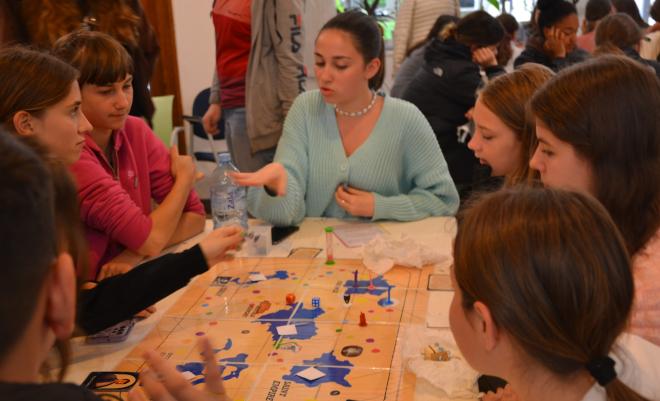day 4
Day 4 (Thursday, 11th of May):
Workshops in school;
playing our board games together;
reflecting our board games - thinking about European values
Workshops in school
The fourth day was dedicated to playing board games and analyzing what was done. We started the day, however, with some workshops. Students (and teachers) could chose among workshops in working with wood (creating a wooden toy as a key holder), with jewellery (creating earrings) and with art (printing).
Playing our board games together
The moment for which we had worked during the whole school year had finally arrived! We played our board games in mixed groups, talked about the history and biographies that are part of the setting of the games, tried out alternative versions of some rules.
preparing the board for the game about Aeneas' way from Troy to Rome:
studying the character cards for the game "Fall of the Berlin wall" carefully:
finding out about the rules of the French setting "Help Louis XIV to bring peace, not war to Europe":
Every "colour group" had the chance to play at least three different games during this session. Everybody was pleased when he or she realised a question, a rule, a challenge that he / she had suggested for a special game when we had worked together online in video conferences and virtual walls.
a Greek question in the German setting: Who knows about currencies in times before the Euro was introduced?
We laughed together about especially funny tasks in the games because most games had inserted pantomime, singing, acting into the games - tasks we had already invented together at the first meeting of the year in Croatia.
We had to talk to each other and plan strategies together to reach the goals of the games together.
It was exciting to see how our first drafts from the beginning of this school year had been turned into real games.
Reflecting our board games - thinking about European values
In the afternoon we worked in small groups or in pairs. Now we reflected the games in a more structured way: Which game was better for younger students, which one more challenging for older ones? How about the fun factor, how about learning about European history? Which European values could we detect in the games, either by the story behind the game or just by playing together for reaching a goal and developing strategies for this, not by playing against each other. What kind of improvement could still be made according to the question cards and other challenges?
We presented our results the next morning in another "gaming session" where we also tried out some of the tipps for improvement. But this is already another day; therefore:
Click here for day 5 of our meeting:















